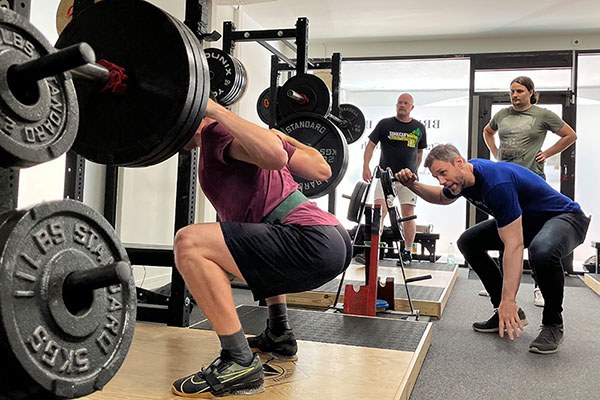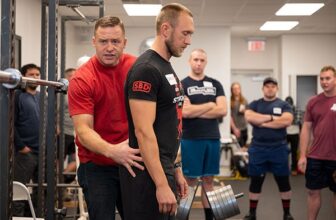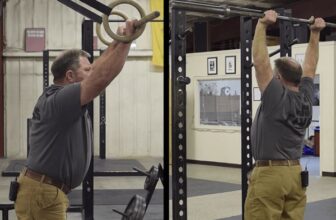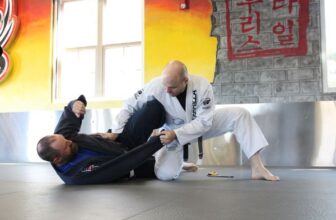
[adinserter block=”2″]
The benefits of barbell training are numerous and well-documented.
From improvements in lean muscle mass, bone density, connective
tissue integrity, and the neuromuscular system as a whole, everything
about our bodies adapts and improves as we get stronger. We train for
strength because the return on investment is so much higher than with
any other physical adaptation; doing anything else, at least at
first, is typically an inefficient use of one’s time. Strength is
the most important physical adaptation for us to pursue, period.
It’s easy to focus on
the external physical and physiological benefits of training because
that’s what we see and feel after getting under the bar. For those
who train, their rapid progress is apparent to everyone around them.
Increases in size and strength can be so dramatic that onlookers
can’t believe this comes from training 3 times a week, using 4 or 5
exercises and adding a little more weight each time. The process is
simple, hard and effective, and it works for everyone whenever
it’s applied correctly. In this context, the
stress/recovery/adaptation cycle is very straightforward.
Those of us who have
spent years doing this have come to appreciate another equally
valuable adaptation that occurs when you show up, train, and don’t
miss your workouts: you learn to do hard things and, more
importantly, you get better at doing them all the time. Your mind
sharpens, your resolve hardens, and you become accustomed to doing
the difficult physical tasks that most people won’t do. There is
immense value in this.
Barbell training is perhaps one of the only activities that is
accessible to virtually everyone; it’s inexpensive, and it presents
an opportunity to confront hard, scary things on a weekly basis. Best
of all, it’s inherently safe, provided you’ve taken the time to
seek out proper instruction. There’s no need to spend a bunch of
money to find thrill-seeking activities when the fourth and fifth rep
of a limit set of 5 will scare the shit of you just fine. If you
don’t know what I’m talking about, then you haven’t actually trained.
Rip has always said that we are narrow-casting when talking about
Starting Strength, and for those who actually hear it and begin to
train, an even further narrowing will occur for those who continue to
push when things inevitably get hard.
With
Growth Comes Fear
Sooner or later, a time
will come when the weight on your back becomes terrifying – and the
fear of failure or even injury can be paralyzing. I’ve seen lifters
literally freeze on the platform, re-rack a heavy bar, and not
attempt a rep they aren’t sure they can complete. A few in my gym
have even gone as far as to stop their workouts on the spot, take
their things and walk out the door. Aside from the feelings of regret
that come from not even trying, if they do this, they are missing out
on quite possibly the most valuable lesson they will ever learn in
the gym: that limits are self-imposed, and very rarely where people
think they are.
Facing fear and
voluntarily attempting to meet it head-on becomes for the mind like
calluses for the hands; it gets tougher and more resilient with
every rep. It also teaches people something about themselves that
they didn’t know before and that will carry over to every other
part of their lives. It’s an invaluable opportunity for personal
growth and provides the individual with a glimpse of a mental
fortitude they didn’t know they had. When that day comes and when
fear enters the mind of a lifter, how does it manifest itself and
what can we do to combat it? Based on my experience, fear on the
platform presents itself primarily in three ways: fear of injury,
fear of failure, and fear of pushing through discomfort.
Fear
of Injury
This is probably the
most common challenge that coaches face when working with their
athletes. Regardless of age or ability, everyone who trains will
experience a weight that for the first time in their training makes
them afraid. They’ll have finally come to a crossroads in their
progress and will have a choice to make: either stop the set and give
up, or try to complete the last rep.
Up until this moment,
they most likely have never intentionally pushed themselves beyond
what is comfortable and have no idea what that feels like. They’ve
been riding the consistent progress of their LP and it’s been
smooth sailing since the outset. Every set has felt within their
ability to complete, and the thought of something going wrong hasn’t
even entered their mind. All of this changes the first time they
unrack the bar and it feels as if they are being crushed under the
weight. They tell themselves that there is no way they can take this
down and stand back up without some joint or muscle giving way,
leading to injury.
This new sensation is
foreign, shockingly abrupt, and extremely powerful. Even with an
experienced coach in their ear – who is communicating with them and
has been watching how well the previous weights moved –
self-preservation often takes over, and the lifter panics as they
hurry to unload themselves of the burden of the weight. It’s at
this point, unfortunately, that some people stop trying to get
stronger and either move on to something else or decide that the
juice isn’t worth the squeeze. The things they move on to, not
surprisingly, are always less-demanding activities. They’ll do some
bootcamps, “train” at home or “take a break” for a while. In
other words: it’s gotten hard, they’re no longer interested, and they
look for something easier to do.
It’s important to
remember that injuries in barbell training are extremely rare, making
strength training among the safest activities to engage in. Doubt
enters the mind of every single lifter who has ever tried to get
stronger, and going through these situations is just part of this
process. It’s important to know that this never goes away – fear
and uncertainty is always present, no matter how long you’ve been
training.
Fear
of Failure
Life is full of ups and
downs, and nobody likes to fail or feel like a failure. Between our
professions, our relationships, and our life choices, there are a lot
of mistakes to make along the way. For some, going to the gym is
supposed to be a “safe” place where they can get stronger, be
free of judgement, and do something positive for themselves. When
they start training, every day is a good day because PRs are
commonplace, the weights aren’t particularly heavy, and everything is
rosy. We want to bottle up that progress and keep it that way
forever, but unfortunately that’s not reality. You will fail
in here. Everybody does, and it’s just a part of the journey.
I repeat: failure is
part of this process. Just like adding weight to the bar, choosing
the correct jumps, and recovery are all parts of getting stronger, so
is failing. I want to preface this by clarifying that we don’t want
to fail unnecessarily by making foolish decisions in the gym.
Skipping meals, getting four hours of sleep, or drinking excessively
the night before a heavy session are all great ways to fail reps.
They’re also completely avoidable.
However, even if we
follow all the right steps leading up to a training session,
sometimes it’s just not there, and you will miss reps. There’s
no shame in this. We’re not robots, and occasionally we fail when we
are expecting to succeed. We must accept that this will happen, but
it shouldn’t provide an excuse not to try in anticipation of a
perceived outcome. When you fail, make sure it’s not because of a
lack of effort but because it just wasn’t there on that
particular day. When in doubt, trust your training and programming up
until that point. Take a deep breath, brace hard and take the fifth
rep down to the bottom and see what happens. If it doesn’t go, it
doesn’t go, and now you know where the line is. Take comfort in the
fact that everyone goes through this. Very likely, the next workout
will be better, and things will continue moving forward. Failure
provides us with valuable data, forces us to look at what we’re doing
and allows us the chance to make changes if necessary.
Fear
of Pushing Through Discomfort
Most people who go to
the gym do so in a way that’s comfortable and easy. They use
machines that make the work easier, they isolate body parts for a
pump, and never train hard enough to actually make real progress. The
one-arm cable rows and lat pulldowns for sets of 15 are comfortable
and easy and aren’t doing anything for them (though the Instagram
videos they post sure look great!). The squat racks are empty, the
machines are full, and everyone in there looks the same as they did
six months ago – from the guys taking selfies in tank tops to the
women doing lunges in odd butt-lifting leggings. They want to
exercise, take vanity photos and pretend that they’re doing something
productive, when in reality they’re just wasting valuable time.
They aren’t
interested in doing hard things because that requires actual effort,
and later on it requires them to do things that are uncomfortable.
Getting under a heavy bar and squatting a PR set of 5 is hard, and
all you need is a pair of sweatpants, a t-shirt, and your belt and
squat shoes. But glute-focused RDLs with a dumbbell in tight pants
and a tank top in just the right light makes for a much better post
on social media. If this is the background of a lifter who is
training for strength for the first time, they’ll be in for a
surprise when the first few weeks of linear progress is in the
rear-view mirror. They will learn that training is hard –
it’s supposed to be that way, and it’s radically different than
what they’ve been doing up until now.
Going to the gym will
start to mean so much more than playing dress-up and taking pictures.
Every workout is tough, there’s an accumulation of fatigue, and
you’ll have to force yourself to put the bar on your back for the
third time the same week. The warm-up sets will start to feel heavy,
but you’ll continue because you’re committed to the decision you
made to get stronger. This stuff is supposed to be hard because easy
doesn’t work. If we want to reap the benefits of getting
stronger, the training is going to be difficult, uncomfortable, and
even confrontational. There’s a reason why most people won’t do it –
most people aren’t interested in doing the hard physical tasks that
will actually have a direct impact on their health and quality of
life. Nothing worth having in life comes easily, and strength
training is no exception.
How
to Face the Fear
Everyone who trains for
strength has faced fear in their workouts, and some do it on a
regular basis. The important thing to understand is that it’s a
natural response to a perceived threat. What lifters feel under the
bar is rarely an accurate assessment of how things are actually going
in the gym. This is the major problem with RPE training for the vast
majority of lifters, but that is a different article.
When fear starts to
creep in, try to quiet your thoughts as much as possible and focus on
one thing that you’re trying to do. Getting stronger is a very
logical process and we go by the data of our training logs, not how
we feel on a particular day. Trust your numbers, the fact that your
training has been well thought out, and expect that some days will
feel a lot worse than they should. If we only trained when we felt
like it, most of us would never step foot in the gym.
Giving yourself one
task to focus on can help you to manage the rep and the situation
you’re in. In the squat, for example, there are many cues you can
use to remind yourself to execute the movement pattern as perfectly
as you can. However, with 500lbs on your back, you often can’t
process much more than the crushing feeling of the weight on your
back. Thinking about one thing, hip drive out of the bottom in this
case, gives us one job that will have a positive effect on the entire
rep, and give us the best chance at succeeding. Take a deep breath,
focus on the task at hand and only the task at hand, brace
hard, ride the bar down to the bottom, and then shove your ass up.
Think about this one thing.
Regardless of how you
feel and how the weight feels, have the guts to try it anyway. Make
or miss, I promise that in the long run, you’ll be glad you did and
proud of yourself for making the effort. This alone, separates you
from 95% of people who go to the gym
Facing fear leads to
change and helps to build character in a way that is totally unique.
Don’t shy away from the weight when it gets heavy, or when doubt
enters your mind. Remember that it’s supposed to be this way – it’s
what you signed up for, and ultimately will make you harder to kill.
Discuss in Forums
[adinserter block=”2″]
Credit : Source Post








